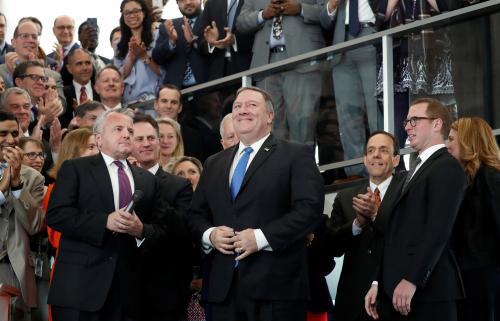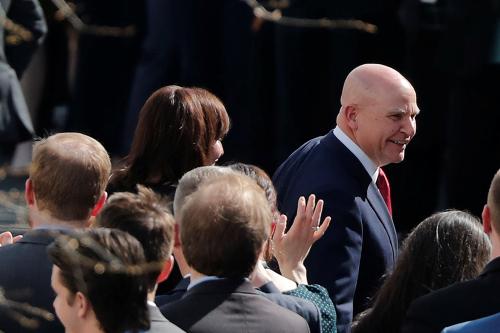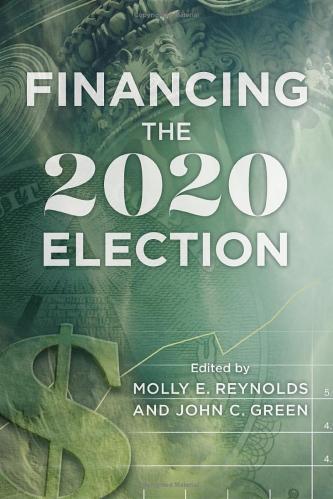Last week, Secretary of State Mike Pompeo reportedly excluded National Security Advisor John Bolton from a meeting with Kim Jong Un’s right-hand man because his participation would be “counterproductive.” If there is tension between the Secretary of State and the National Security Advisor, it would hardly be a surprise—the National Security Council (NSC) has steadily increased its role in foreign policy decision-making at the expense of the State Department. Reports by the Atlantic Council and American Enterprise Institute trace this trend over several administrations. Many in the foreign policy community hoped that Secretary Pompeo would reassert State’s historical foreign policy preeminence, but can the trend be stopped or has foreign policy leadership shifted permanently from State to the NSC?
Since the George H.W. Bush administration and his National Security Advisor Gen. Brent Scowcroft, the NSC has steadily expanded its size and purview. Under the Obama administration the NSC staff ballooned to more than 400 personnel, leading former Secretary of Defense Robert Gates to remark that the NSC staff was “driving [him] crazy” and subjecting his agency to “micromanagement by 35-year-old PhDs who love to talk.” Similar complaints have been made by former Defense Secretaries Leon Panetta and Chuck Hagel, prompting Congress to enact legislation in 2016 which caps the NSC staff size at 200.
Many foreign policy analysts have argued that the size of the NSC staff is only a symptom of a larger problem: the NSC has overstepped its mandate, abdicating its role of interagency “honest broker.” For more than a decade, critics have argued that the NSC needs to be reined in to operate as a coordinating body, not a miniature State Department located at the White House. Some want to see the NSC adhere more closely to a narrow interpretation of the organization’s establishing legislation. All of these critiques have merit but reflect a desire to return the NSC to a halcyon past that probably never existed and certainly can’t be recreated.
The genie is out of the bottle and can’t be put back. All presidents, regardless of their personal interest in matters of foreign policy, inevitably get sucked into international entanglements that influence and shape their domestic popularity. Even aspiring isolationist presidents quickly realize that they will be judged at the ballot box in part because of their performance in international affairs. As a result, presidents will continue to take an active interest in the foreign policy decision-making process and continue to demand information and updates in real time from those in closest proximity.
The modern news cycle demands that the president be well informed of international events at all times. This insatiable need for information puts pressure for fast answers on the bureaucracies of national security agencies, especially the Department of State. Unfortunately, years of neglect and failure to modernize have rendered the department’s bureaucracy unable to formulate policy recommendations either internally or across the interagency at the speed demanded by the president. This inefficiency has been perceived—at times justifiably—by presidents as a reflection of willful bureaucratic intransigence or the existence of a “deep state” whose policies are at odds with the president.
It’s also inconceivable that future presidents will voluntarily choose to devolve more foreign policy decision-making responsibility to the Secretary of State, especially now that the position is frequently encumbered by individuals with their own larger-than-life public image (and potential future political ambitions) rather than presidential loyalists.
To create greater balance between State and the NSC, and ensure the president’s needs are being met, a new model must emerge that accounts for the current reality rather than regresses to the past. This new model should start by defining the State Department’s unique capabilities.
Since 1961 the department has—at times willingly—seen its preeminence in diplomacy eroded as traditionally domestic-focused agencies have increased their international presence. No agency has benefited more from State’s retreat than the Department of Defense, which now operates in almost all areas once covered exclusively by State (and USAID). But other agencies like the US Trade Representative (USTR), Commerce, Treasury, Justice, the Centers for Disease Control (CDC), Agriculture, and others have all increased their international activity and raised questions about the role of the State Department. “Diplomacy” is no longer the exclusive domain of State; now, most agencies conduct diplomacy, often without the coordination of State.
Unwilling to acknowledge its own decline, State has fiercely defended the existence of offices and bureaus that are now redundant. State must concentrate its limited resources on the four functions where it has a competitive advantage to exercise greater influence in the interagency decision-making process and demonstrate value to the president. The first is area expertise. State has a presence in over 200 posts and its personnel spend years overseas learning the nuances of foreign cultures and politics. No other agency can replicate that depth of knowledge.
Second, the Secretary of State still has the authority to negotiate on behalf of the president and can participate in high-level diplomatic engagements where a single representative of the U.S. government is necessary. The Secretary’s stature can probably extend down as far as the Undersecretary level with credibility. Below the Undersecretary level, there are too many instances where other cabinet secretaries or high-ranking military officials are seen as more desirable interlocutors by foreign governments.
Third, as a result of the dissolution of the United States Information Agency (USIA) in 1998, State now leads U.S. public diplomacy efforts. State is unrivaled in its ability to reach foreign audiences, share American values, explain American policies and administer exchange programs that bring visitors to the United States. That leadership position would be further strengthened by increasing State’s control over the Broadcasting Board of Governors (BBG) and perhaps the Peace Corps as well.
State’s most important, unique capability is often underappreciated: the administration of American Citizen Services (ACS) including issuing passports, visas, and helping Americans when they are overseas. The majority of Americans and foreigners have no other contact with the Department of State apart from the ACS and consular functions.
This is the first line of border defense and the face of America to most of the world, yet it was not mentioned in State’s most recent agency review, the 2015 Quadrennial Diplomacy and Development Review (QDDR). Consular services are a major source of revenue for the department and no other agency has the ability to perform this function.
By concentrating State’s efforts on these four core areas, State can jettison many of the functions that currently serve only to congest bureaucratic processes.
A more focused State Department will provide the president with clarity on the roles of other agencies within the interagency. It will also reflect the reality that the NSC is going to play a role in policy formulation and is unlikely to cede its more activist role back to the Department of State. Secretary Pompeo will serve President Trump better if he (Pompeo) is not engaged in a bureaucratic turf war with Bolton, and such stability is only possible if Pompeo makes State’s interagency role clear—something that’s been missing for some time.
The Brookings Institution is committed to quality, independence, and impact.
We are supported by a diverse array of funders. In line with our values and policies, each Brookings publication represents the sole views of its author(s).










Commentary
Can Pompeo and Bolton coexist?
June 7, 2018